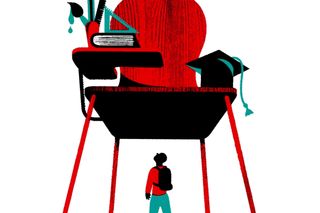
‘Tuition Culture’ Overwhelms Students’ Wellbeing, Stifles Academic Growth
Plus, private tuitions strain parents’ budgets and disincentivize teachers.

When I was younger, tuitions were a part of my academic life, but only as a means to supplement the subjects that I found difficult to understand or needed some additional help in. However, today, the tuition culture is an intrinsic part of our children’s lives, taking over their childhood. A typical day is spent going to school and then rushing to attend tuitions to cement what is already taught that day or the day before. This constant studying stifles the academic growth that should be the true intention behind tuitions.
The rise of tuition culture
One of the reasons for this rise in tuition culture can be attributed to the immense importance that parents, society and even schools place on grades. There is a notion that a child is only as smart as the grades they get and to ensure good marks, private tutors are necessary. Another argument stems from the feeling that some school teachers don’t complete or go in-depth into certain chapters and concepts – therefore, children have to rely on tuitions. This can create a vicious cycle that disincentivizes teacher performance because teachers are aware that one out of four students in their class will learn the material outside of school. This number rises to three out of four students, in states such as West Bengal and Tripura, according to the 2014 National Sample Survey (NSSO) report on Education in India.
Article continues below
Tuition culture is not just a problem in India, but is prevalent in other countries as well. In an article published in the Economic and Political Weekly in 2015, the authors cite that in Japan, 70% of middle school students have received private tuitions, while in Malaysia, 83% of senior secondary students receive tutoring. These numbers are similar or higher in South Korea, for primary through high school students, where as many as 92.8% of students in middle school attend private tuitions.
While these countries and educational systems are all very different, they do have one thing in common: the pursuit of academic excellence, including via private tuitions, generates “a shadow cost,” as one researcher puts it, “in the form of reduced wellbeing of students. ”
The downside to tuitions
Tuition culture, which requires constant studying while forsaking all other passions, can be detrimental to children. They start feeling burnt out and trapped. They become discontent with their school system, and may not see the benefit of going to school as they feel everything will be repeated at tuitions in any case. The pressure to receive high grades can also lead to academic-related stress. In a study conducted in Kolkata, 63.5% of students reported stress due to academic pressure, while 81.6% of students reported examination-related anxiety.
As such, they can become less attentive and lose focus easily and start looking for distractions to get through the school day. This detachment from learning can affect them beyond school, as well, as they don’t have time to pursue other passions and develop skills beyond academics. The time spent in tuition takes away from multiple extracurricular activities such as performing arts, sports, robotics, computer skills and more. Apart from this, since children with a constant roster of tuitions study all day, every day, they learn to study longer — but not smarter, while neglecting important life skills such as researching their own doubts about a concept, and the determination to dig deeper for greater understanding on their own, rather than being spoon-fed at tuitions.
Related on The Swaddle:
Education of the Future Is Not About Knowledge
Tuition culture is also a strain on parents, both financially and psychologically. According to a Times of India article based on the NSSO report, an estimate of 11 to 12% of a family’s income is spent on tuitions, with a 2015 study stating that the mentoring industry in India has grown by 53% in the past few years, and will likely touch $70 billion in 2017. Additionally, the constant struggle to ensure that your child is taught by the best tutors in the city can be emotionally draining. Speaking to some parents recently, I learnt that now, some tutors are conducting entrance tests before accepting children into their classes, forcing parents to plan tuition applications years in advance and likely excluding the children who most need academic support. Earlier, parents only had to plan their applications for schools and colleges in advance, but now tuitions are a part of this as well.
Leaving tuition culture behind
The Supreme Court in 2012, brought “all schools, except the unaided minority institutions, within the ambit of the Right of Children to Free and Compulsory Education Act gave rise to an eventuality — teachers of all schools could be prohibited from giving private tutorials,” reported the Times of India. This was followed up in 2017 in Maharashtra when the Deputy Director of School Education banned teachers across the state from taking private tuitions.
As a consultant in the education space, I speak to families about children’s academics all of the time and have noticed a trend: most want to get away from tuition mania. They want their children to build self-study skills and are vocal about the fact that they hardly get to see their children, between school, extracurricular activities and tuitions. But they worry about their children achieving the marks they need in order to succeed in life.
Employers need to start hiring people who may not have the best grades, but have explored and challenged themselves with knowledge and skills beyond the realm of academics. Once employability becomes more holistic and less grade-orientated, we can hope to see a similar change in the minds of parents and students alike.
Tuitions can exist in a healthy balance, assisting children who need extra academic support. However, this balance will only be maintained when the mindset of the society as a whole changes, along with a shift in the professional and job space as well.
Sheetal Vora is an undergraduate consultant with The Red Pen who has visited and built relationships with admission officers at more than 50 campuses across the world. Sheetal is driven by the will to bring out the best in students. She holds a bachelor's degree in business and entrepreneurship from Mumbai University, and an interior design diploma from Sophia Polytechnic.
Related


When Menopause Masks Ovarian Cancer, Vital Treatment Gets Delayed
